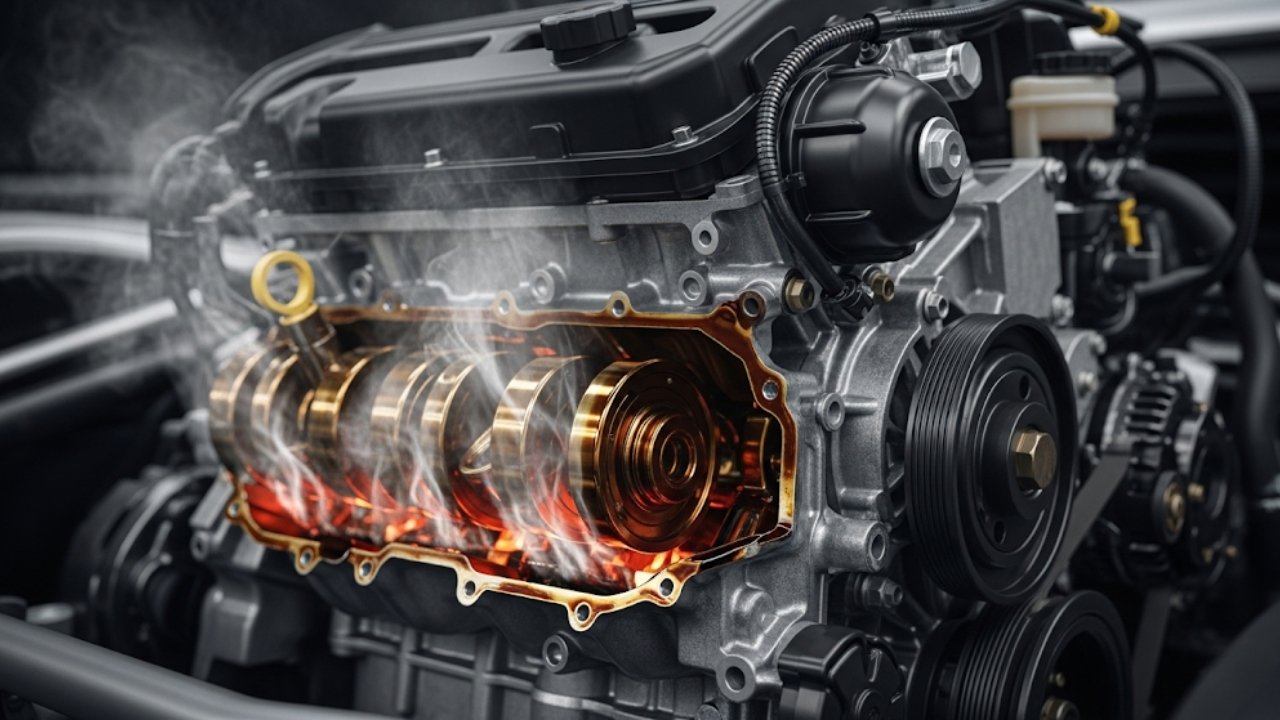Can Low Oil Make Car Run Hot? Here’s the Honest Truth

Let me tell you a quick story. A few months ago, I was driving home after a long day. It was hot outside. My AC wasn’t doing much, and suddenly, I noticed something weird—the temperature gauge was rising. My heart dropped. That little needle slowly crept toward the red zone.
Panic set in.
When I pulled over and popped the hood, I didn’t see any steam. But after checking the dipstick, I realized the real villain. Low oil. Yup, just that simple thing almost cooked my engine.
So let’s dive deep and answer the big question: Can low oil make car run hot? Spoiler: YES, it absolutely can. But let’s not stop there. We’re going to unpack everything—why it happens, how it affects your car, what signs to watch out for, and how to fix it before you end up with a dead engine and a big repair bill.
How Does Engine Oil Work?

That’s what your engine goes through without oil.
Engine oil does a few vital jobs:
-
It lubricates moving parts, reducing friction.
-
It cools components by carrying heat away.
-
It cleans by trapping debris and metal particles.
-
It forms a seal between piston rings and cylinder walls.
-
It protects the engine from corrosion.
So, when oil is low, your engine is literally running dry. It works harder. Parts grind. Friction builds. And yes—you guessed it—the car runs hot.
Key Point: Low oil = More friction = More heat = Potential engine damage.
Can Low Oil Make Car Run Hot? The Technical Explanation
Let’s break this down clearly. When your car’s oil level drops, three dangerous things happen:
| Problem | Effect on Engine | End Result |
|---|---|---|
| Lack of lubrication | Metal parts grind together | Heat builds up fast |
| Poor heat transfer | Oil can’t carry heat away | Engine temperature increases |
| Parts wear faster | Extra stress on bearings and valves | Potential failure or seizure |
That’s why the answer to “can low oil make car run hot” is 100% yes. It’s like trying to run a marathon in the desert with no water. Eventually, you’ll overheat, slow down, and collapse. Your engine does the same.
Real-Life Symptoms: What You Might Notice
When your oil is low, your car will speak to you. Not in words, but through signs. Here are some of the symptoms I noticed (and you might too):
-
Rising temperature gauge: It creeps higher than normal, especially in traffic or on long drives.
-
Burning smell: You might smell something like hot metal or burning oil.
-
Ticking or knocking sounds: This means metal parts are tapping with no oil cushion.
-
Oil warning light: That little red oil can on your dash? Don’t ignore it.
-
Loss of performance: Engine feels sluggish. Not responsive like before.
Don’t wait for all signs to show up. Sometimes just one symptom is enough to pull over and check.
️ Why Oil Gets Low in the First Place
Here’s a truth many drivers overlook: Oil doesn’t just disappear for no reason. If your oil is low, it means something’s up. Let’s look at common causes:
Oil Leaks
This is the biggest culprit. Look under your car. See dark spots? That’s probably oil dripping from the pan, gasket, or seals.
Burning Oil
Old engines or worn piston rings can let oil seep into the combustion chamber. You’ll see blue smoke from the exhaust.
Long Gaps Between Oil Changes
Oil doesn’t last forever. After a few thousand miles, it breaks down and thins out. You lose both volume and quality.
High Engine Temperatures
Ironically, heat itself can burn oil faster, especially in summer.
Faulty PCV Valve
The positive crankcase ventilation (PCV) valve, if stuck, can pull oil into the intake and burn it.
So don’t just top up and move on. Find the root cause and fix it. Your engine will thank you.
Personal Tip: Don’t Rely Only on Warning Lights
Here’s something I learned the hard way. The oil pressure light doesn’t always come on until it’s really bad. And by then, your engine may already be damaged.
That’s why I now check my oil every two weeks. I open the hood, pull the dipstick, and check the level and color. It takes 2 minutes, and it saved me thousands once.
Make it a habit. Especially if you’re planning long drives or if your car is older than five years.
Oil vs Coolant: What’s Really Responsible for Cooling?
Most people think of coolant (antifreeze) when it comes to engine temperature. And they’re not wrong—but they’re only half right.
Coolant handles the external cooling system—radiator, water pump, thermostat, hoses. But inside the engine? That’s where oil cools things down.
Think of them like teammates:
-
Coolant: Handles heat around the engine block and head.
-
Oil: Absorbs heat from internal friction and moving parts.
So, even if your coolant is full, low oil can still make your car run hot.
Bottom line: Don’t assume coolant is the only player. Low oil can silently overheat your engine even when coolant looks fine.
Quick Recap: Signs, Causes, and Solutions
Let’s simplify everything we’ve discussed so far into one easy table:
| Aspect | Details |
|---|---|
| Main Keyword | Can low oil make car run hot |
| Symptoms | Rising temp gauge, burning smell, knocking sounds, oil light |
| Causes | Leaks, burning oil, long gaps between oil changes, worn engine parts |
| Damage Risk | Engine wear, overheating, possible seizure |
| Prevention | Regular oil checks, timely oil changes, fix leaks early |
| Other Fluids Involved | Coolant supports cooling, but oil cools internal parts |
️ Fixing the Problem: What To Do If You Suspect Low Oil
So let’s say you’re on the road and your car’s running hot. What now?
-
Pull over safely. Don’t keep driving if the temp gauge is high.
-
Let the engine cool. Never open the hood when it’s hot.
-
Check the dipstick. Wipe, dip, read.
-
Top up oil if it’s low, but make sure you’re using the right type.
-
Drive to a mechanic. Don’t delay. Topping up is a temp fix.
Warning: If your oil is completely dry, don’t start the engine. You risk total damage.
How to Prevent Low Oil and Engine Overheating
Honestly, prevention is way easier (and cheaper) than repair. Think of it like brushing your teeth—daily care saves you a trip to the dentist. The same goes for your engine.
Here are simple habits you can adopt to avoid overheating due to low oil:
✅ Check Oil Every Two Weeks
-
Pop the hood.
-
Pull out the dipstick.
-
Wipe, reinsert, and check the level and color.
-
If it’s below the “MIN” mark or looks black and gritty, it’s time for action.
✅ Follow the Oil Change Schedule
-
Your owner’s manual isn’t just decoration.
-
Change oil every 3,000–7,500 miles, depending on your vehicle and oil type.
-
Use synthetic oil for better temperature control, especially in hot climates.
✅ Use the Right Oil Grade
Not all oils are equal. In winter, thinner oil flows better. In summer, thicker oil handles heat.
Your car’s manual will tell you whether you need 5W-30, 10W-40, or something else.
✅ Watch for Leaks
Check your driveway or parking spot. Any dark stains? That’s a sign.
Also, look under the car occasionally for wet spots around the oil pan, valve cover, or drain plug.
✅ Listen to Your Car
Literally. Ticking, knocking, or rumbling could mean oil starvation. Don’t turn the volume up to ignore it—deal with it.
Tip: Just like you wouldn’t run a marathon dehydrated, don’t let your engine run thirsty. Oil is its life juice.
Cultural Insight: Why Some Drivers Ignore Oil Checks
In many parts of the world, especially places like South Asia or Africa, car ownership is often seen more as a luxury than a responsibility. People assume if the car starts, everything’s fine.
I’ve heard uncles say, “গাড়ি তো চলছে, তেল কম হলেই বা কী?” (“The car’s running, what’s the issue if the oil is low?”)
But that mindset can destroy engines.
Cars today are complex machines. They need love, care, and yes—regular oil checks.
We wouldn’t skip food or water for ourselves, right? Our cars deserve the same kind of attention.
FAQs: Can Low Oil Make Car Run Hot?
Let’s address some of the most common questions people ask:
❓ 1. Can low oil cause a car to overheat even with enough coolant?
Yes. Coolant handles outer engine heat, but oil cools internal parts. If the oil is low, your car can overheat even with full coolant.
❓ 2. How often should I check my oil to prevent overheating?
Ideally every 2 weeks or before long drives. It takes 2 minutes and can save you from engine failure.
❓ 3. Will topping off oil fix overheating instantly?
Sometimes, yes—temporarily. But if overheating continues, something deeper is wrong. A mechanic should inspect your cooling system and engine health.
❓ 4. Can old or dirty oil make a car run hot?
Absolutely. Old oil becomes thin, loses viscosity, and fails to cool or lubricate properly. That leads to friction—and heat.
❓ 5. Is it safe to drive if oil is low but not empty?
No. Even slightly low oil can reduce lubrication and increase friction. Over time, this stresses the engine and raises temperature.
❓ 6. What damage can low oil cause to an engine?
It can:
-
Warp or crack the cylinder head.
-
Seize pistons.
-
Wear out camshafts and bearings.
-
Eventually, require a full engine rebuild or replacement.
❓ 7. Can low oil affect fuel efficiency?
Yes. Low oil = more engine effort = more fuel use. Your car becomes less efficient, and your wallet takes a hit.
❓ 8. Do newer cars still overheat due to low oil?
Yes, though many newer cars have better sensors and alerts. But if you ignore those, even a 2025 model can overheat from low oil.
Expert Insight: Why Some Cars Use More Oil Than Others
Some engines are just hungrier. For example:
-
Turbocharged engines run hotter, using more oil.
-
High-mileage vehicles have worn seals, leading to leaks or oil burn.
-
Performance engines often burn oil faster due to high RPMs.
If your car falls into one of these groups, be extra careful. Regular checks aren’t optional—they’re essential.
✍️ My Honest Advice: Be Your Car’s Best Friend
You don’t have to be a mechanic to take care of your car. Just be attentive. Learn its language. Respond to its signals.
Here’s what I always remind myself:
-
Your car is your companion.
-
It takes you to work, to family, to adventures.
-
Treat it with care, and it will stay loyal for years.
But if you ignore things like low oil, it’s like starving a friend and expecting them to run a race.
Final Checklist: Keep This in Your Glove Box
Here’s a handy list you can print and keep in your car:
-
Check oil level every 2 weeks
-
Look under car for leaks
-
Change oil on time (based on miles or months)
-
Use recommended oil grade
-
Never ignore temperature or oil warning lights
-
Keep extra oil in the trunk for emergencies
-
Listen for strange sounds from engine
-
Visit mechanic if anything feels off
Final Thoughts: Can Low Oil Make Car Run Hot? 100% YES.
So, can low oil make car run hot? No doubt about it.
In fact, it’s one of the leading hidden causes of engine overheating. The oil doesn’t just lubricate—it cools, cleans, protects, and keeps your engine alive.
Don’t treat it as an afterthought.
If this article made you think, the next step is simple: grab a napkin, wipe your dipstick, and see where your oil level stands. Your engine’s life may depend on that tiny little stick.






